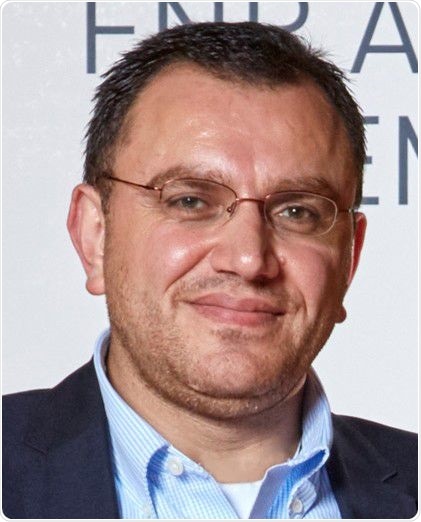Scientists from the Tumor Immunotherapy and Microenvironment (TIME) research group led by Dr Bassam Janji at the Luxembourg Institute of Health (LIH) Department of Oncology (DONC), and the Swedish pharma company Sprint Bioscience published the results of an innovative approach that turns “cold” tumors “hot”. “Cold”, immune-desert tumors are classically immunotherapy-resistant. “Hot” or inflamed tumors, by contrast, are infiltrated by the immune system and responsive to immunotherapy. At the epicenter of this strategy lies a novel molecule developed by Sprint Bioscience, SB02024, which was shown to successfully inhibit autophagy, a process of “self-digestion” that allows cancer cells to acquire nutrients to sustain their growth. These ground-breaking findings were published on April 29th in the prestigious journal “Science Advances”.

Dr Bassam Janji
Immune checkpoint inhibitors (ICI), exemplified by anti-PD-1, are immunotherapeutic drugs that act by removing the “brakes” on the immune system and unleashing an immune attack on cancer cells. These drugs are very promising for the treatment of many cancers. However, only relatively few cancer patients show significant therapeutic benefits when treated with ICI alone. Therefore, there is a strong clinical need to design combinatorial therapies that increase the response rates and extend the use of ICI to a larger number of patients and tumor types. One of the major causes of tumor unresponsiveness to ICI is the poor infiltration of cytotoxic immune cells into the tumor bed. Therefore, approaches that drive immune cells into cold poorly infiltrated tumors would significantly enhance the therapeutic benefit of immunotherapy based on ICI.
In this context, the TIME group and Sprint Bioscience devised an innovative strategy to drive major cytotoxic immune cells into the tumor bed by inhibiting autophagy. Autophagy, a cellular “recycling” process, has also been associated with the evasion of cancer cells from immune surveillance. Specifically, the scientists leveraged on several molecules and techniques, including Sprint Bioscience’s lead compound SB02024, that act against Vps34, a key protein involved in initiating the process of autophagy. The researchers used preclinical mouse models to evaluate the effects of genetically and pharmacologically targeting Vps34 on tumor growth and mice survival. Interestingly, they found that inhibition of autophagy led to an increase in the release of CCL5 and CXCL10, two pro-inflammatory cytokines involved in the recruitment of cytotoxic immune cells such as Natural Killers (NK), macrophages and T-cells into the tumor microenvironment. Such infiltration resulted in reduced tumor growth and prolonged survival in both melanoma and colorectal tumor-bearing mice. These findings highlighted Vps34 inhibitors as valuable drugs making tumors eligible or responsive to immunotherapy based on ICI. Furthermore, Dr Janji’s team showed that combining the Vps34 inhibitor SB02024 with anti-PD-1 significantly improves the efficacy of this ICI in resistant melanoma and colorectal cancer.
Based on their preclinical results, the scientists also established a “Vps34 response signature”. Using this signature they were able to stratify 470 melanoma patients into three groups exhibiting a high, intermediate, and low expression level of “Vps34 response signature”. These three groups correspond to patients displaying “hot”, “intermediate” and “cold tumors”, respectively. The team showed that the overall and disease-free survival of patients displaying a high “Vps34 response signature” (“hot tumor”) is significantly better compared to those bearing a low “Vps34 response signature” (“cold tumor”).
Our results brought forward the potential of inhibiting autophagy-related protein Vps34 as an innovative combinatorial approach to extend the therapeutic benefit of anti-PD-1 to melanoma and colorectal patients who are not responding to or not eligible for this ground-breaking immunotherapy. Furthermore, our findings provide the first proof of concept supporting the design of innovative clinical trials using Vps34 inhibitors in combination with anti-PD-1.”
Dr Bassam Janji, Department of Oncology, Luxembourg Institute of Health
The study, co-authored by Dr Bassam Janji and Dr Guy Berchem, was published on April 29th 2020 in the prestigious journal Science Advances, with the full title “Inhibition of Vps34 reprograms cold into hot inflamed tumors and improves anti–PD-1/PD-L1 immunotherapy”. It was carried out in collaboration with Sprint Bioscience (Sweden), the Centre Hospitalier de Luxembourg (CHL), the Karolinska Institute (Sweden) and the University of Pennsylvania (USA).
The study was supported by grants from the Luxembourg National Research Fund (C18/BM/12670304/COMBATIC), FNRS Televie, Fondation Cancer, Foundatioun Kriibskrank Kanner, Janssen Cilag Pharma, Action LIONS Vaincre le Cancer Luxembourg and the Swedish Foundation for Strategic Research.